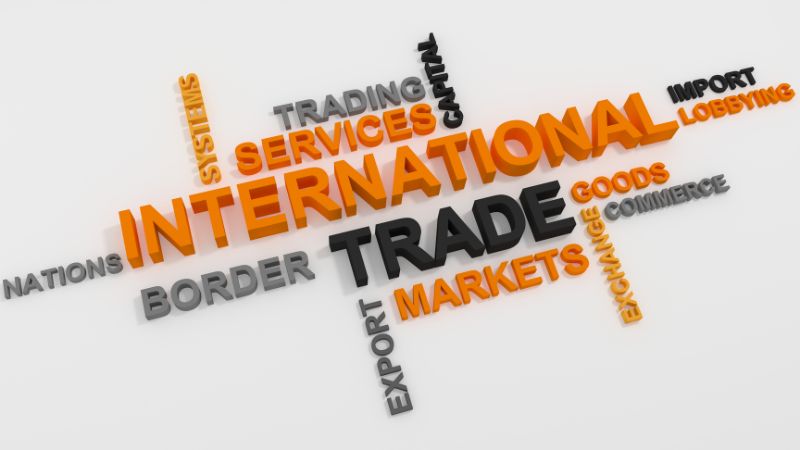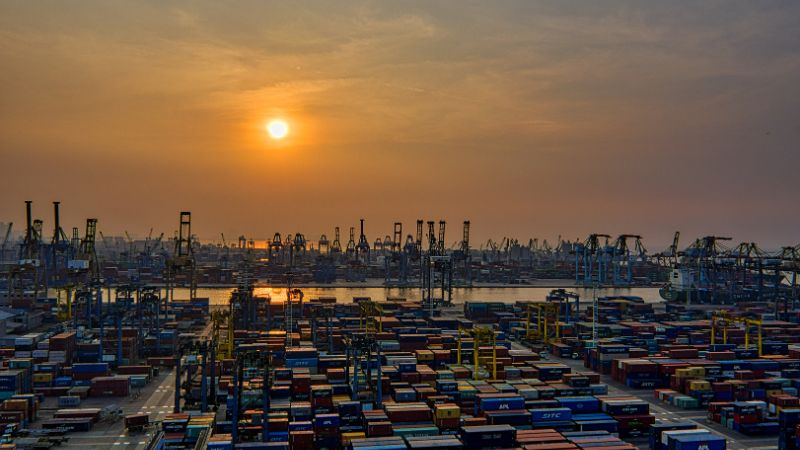Categories
Trade Finance | The Complete Guide

Covering a wide range of financial products for businesses that operate internationally, trade finance is an essential component of the financial toolbox for exporters and importers.
This guide provides everything you need to know understand trade finance in greater depth, and how to expand your business onto the worldwide market.
Table of Contents
What is Trade Finance?
Trade Finance: on a World Scale
Trade Finance vs. Trade Finance Loans
Trade Finance vs. Supply Chain Finance
8 Types of Trade Finance
Obtaining Trade Finance
What is Trade Finance?
Trade finance is not a single product, but rather an umbrella term that covers a wide range of financial products and associated methods used to facilitate business-2-business transactions between companies in different countries.
When one company wants to purchase at scale from another in a different economy, risks become apparent that are not part of the usual national business process.
These risks can make businesses nervous and even upset deals entirely or, if unguarded, can lead to significant losses.
Consider, for example, the difficulty that exists in simply working with a business using a foreign currency. Orders that are placed assuming one exchange rate may end up costing more by the time they are shipped. If there is a delay to payment, the supplier could be significantly out of pocket on the transaction; equally, the buyer could find the end bill substantially higher than expected.
One aspect of trade finance exists to avoid these problems, agreeing terms and speeding up payments to ensure neither business is left unhappy.
Other problems, such as trusting that a consignment will be shipped when payment is made, or equally, that shipping a consignment will result in payment, can make companies cautious regarding international business. Trade finance is there to provide a measure of security, ensuring deals can take place.
Want to discuss the best trade financing options for your business? Speak to an expert today.
Trade Finance: on a World Scale
A country’s economic growth is dependent on how well businesses within that country can trade with those in different countries.
If businesses are locked and only able to trade nationally, then the country’s economy stagnates. Trade finance, therefore, is a key component in worldwide economic growth and supports more than 80% of overall world trade.
Countries with poor trade finance - those who are developing or low-income countries - can suffer and struggle to grow, consequently, worldwide organisations such as the WTO, World Bank, and IMF fully support trade finance providers and work consistently to sustain modern trade finance networks across the globe.
Trade Finance vs. Trade Finance Loans
When discussing trade finance, it is important to make a differentiation between trade finance as a term to cover all aspects of financial and administrative support for international trade, and trade finance loans, which are a specific subset of business loans developed to use when a company needs additional finance to import goods.
While some companies concentrate purely on trade finance loans, often using the term ’trade finance’ to describe them, we use the broader term ‘trade finance’ to cover all aspects of the international commerce system, and ‘trade finance loans’ when discussing the associated commercial finance option.
Trade Finance vs. Supply Chain Finance
A second terminology confusion that can arise is between the term trade finance and another subset of business finance known as supply chain finance.
Again, some companies who deal exclusively in supply chain finance may choose to refer to their product as ‘trade finance’. At Clifton Private Finance, we offer supply chain finance options (discussed later in this article) as one of the many trade finance solutions for our clients.
8 Types of Trade Finance
There is a wealth of finance options that exist to support international trade and commerce. While some of these will be familiar to businesses well-versed in corporate finance, they are often expanded and their scope widened when used for international transactions. For the purposes of this trade finance article, all finance products described are considered within the scope of international trade.
1. Documentary Credit or Letters of Credit
One of the primary aspects of trade finance is that of the documentary credit (D/C) or letter of credit (L/C). This is a document of assurance that is provided by the importers (buyers) bank to the exporter (seller) to promise that payment will be made once the export conditions have been met.
When the bank is satisfied that the conditions have been met, most often in terms of confirmed shipping documentation, the money is released to the exporter and payment is considered made in full.
This middleman process protects both importer and exporter. For the importer, there is assurance that their money won’t leave their bank account until the goods are actually on the way; for the exporter, there is clear confirmation that if they do ship the goods, they are going to be paid for them.
Documentary credit is not without its downsides, however.
First there are the fees that must be paid to the bank, and it can add additional time to the deal in order to obtain them.
Furthermore, documentary credit is not a complete protection against the possibility of fraud; it presents a layer of confidence between established businesses and should not be considered a foolproof method of security that replaces other aspects of due diligence.

2. Trade Finance Loans
A trade finance loan is a specific loan type that serves both as financial assistance for an importer and an additional layer of protection for both importer and exporter similar to a documentary credit.
For businesses looking to import goods from an international seller to fulfil an established order, a trade finance loan can be the perfect product to provide the capital needed for the purchase, as well as providing some security in making the transaction.
Rather than the capital being provided to the applying business, it is held by the lender to be paid to the exporter once the goods involved have been shipped.
Trade finance loans are a form of purchase order loan that has been developed for international trade, and they follow a similar set of guidelines for application:
The applying business (the importer) must hold a contract (purchase order) with a customer on which the loan is based. The goods would then be provided by an international supplier (the exporter) to fulfil the transaction.
The business credit histories of the importer, the customer, and the exporter will all be considered in a loan application, and the loan size and terms will be adjusted based on these; thus companies that are well established with strong credit reports will obtain more favourable trade finance loan terms.
With a trade finance loan, international shipping is made easier and swifter. With the confidence of a major lender providing the finances, exporters will expedite orders without delay and the importer can fulfil their customer’s order with efficiency.
Trade finance loans follow the following process:
- The end customer raises a purchase order with the importer for the goods
- The importer arranges the trade finance loan to cover the cost of the goods for import
- The exporter invoices the lender for the shipped goods
- The lender pays the exporter
- The importer receives the goods
- The importer supplies the end customer
- The end customer pays their invoice to the lender
- The lender pays the importer the profits, minus their fees
Trade finance loans can take slightly different forms, as an import loan for importing materials before selling on domestically, as an export loan to finance contract production costs prior to shipment, or as a stock loan used to fund ongoing, regular stock turnover.
In all three cases, however, the model remains similar with an end customer’s purchase order or similar contract used as collateral to secure the loan.

3. Trade Finance Revolving Credit
Alongside a single trade finance loan, is the opportunity to set up a revolving credit facility that satisfies a similar purpose.
Trade finance revolving credit is offered to businesses who need an ongoing loan facility for international trade; for example, those who will be importing stock or production inventory on a regular basis, to service either an ongoing client or an established larger customer base.
Trade finance revolving credit facilities (also called ‘lines of credit’) provide an excellent way for a business to expand its effective capital and manage cash flow for worldwide commerce. Like a trade finance loan, the revolving credit facility makes payments directly to exporters, providing an extra layer of security for both importing and exporting companies.
4. Invoice Finance
Invoice finance represents a pair of products that can provide cash flow support when invoice payment terms create difficulties.
Financial institutions experienced in working with both international trade finance and invoice financing are able to offer both invoice factoring and invoice discounting products to businesses in the UK who are:
- Exporters waiting on invoice payments from international importers
- Importers who are part of an international supply chain awaiting invoice payments from domestic clients
- Businesses seeking an ongoing revolving credit facility based on accounts receivable to facilitate ongoing global trade
- Businesses looking to add an additional layer of financial guarantee and support for international trade though invoice factoring
5. Supply Chain Finance
Supply chain finance, also known as supplier finance or reverse factoring is a way to ensure invoices are paid promptly by setting up a revolving line of credit facility with the express purpose of covering incoming invoices without delay.
As there are fees involved, supply chain finance does come with a downside. These fees are typically covered by the supplier (the exporter), who gains the advantage of swift payment of their invoices, but it may mean that the supply chain finance is unsuitable for some international arrangements.
In terms of trade finance, supply chain finance is another financial product that provides an extra layer of security for both exporter and importer, increasing confidence that goods will be paid for immediately upon shipping.
Supply chain finance, as the name suggests, is often utilised when long chains of supply have been developed to ensure payment and shipping delays are kept to a minimum. With worldwide trade, it is especially important to ensure that the finances are in smooth order, thus supply chain finance is an increasingly welcome tool used by many global businesses.
6. Guarantees and Bonds
In addition to the pure financial products that form a substantial part of trade finance, banks and other financial institutions also help secure international trade through the issuing of bonds and guarantees.
These are agreements by the banks to provide financial compensation to a buyer should a seller fail in their obligations.
Types of bonds include:
- Bid or Tender Bonds - To avoid ‘fishing’ and frivolous tenders from contractors who are unable to undertaking the work, a bid bond of between 2% and 5% of the contract value can be issued. Should the contract then fall through, the supplier would be provided the bond as a penalty for time wasted.
- Performance Bonds - Working with new contractors involves a risk that quality standards will not be met. A performance bond is issued by a bank or insurance company to guarantee that the project will be completed to the expected standard.
- Advance Payment Bonds - To protect the buyer when an advance payment has been made to the seller, advance payment bonds are there to ensure that refunds will be made in the event that the final product does not meet expectations.
- Conditional Bonds - These bonds exist to serve as liability that will be paid out if there is a breach of contract, or if a predefined event has come to pass.
- Warranty and Maintenance Bonds - Time-specific warranties on equipment supplied or work completed are often desirable to provide an additional guarantee that expected use does not result in the equipment or work failing.
7. Export Forfaiting
When a business is a position where they worry if a foreign importer will make payment, it is possible for them to utilise export forfaiting. This system allows an exporter to sell the rights to the payments to a forfaiter at a discount.
The forfaiter then takes on the debt in full, assuming all risks associated with recovering payment from either the importer or any guarantor.
In this way, exporting businesses have a final line of support to ensure that payment for goods and services sold overseas are recovered.
8. UK Export Finance
To assist with the growth of UK exports, the UK government, through UK Export Finance supports businesses looking to expand through export with a range of schemes that include guarantees to your bank to obtain trade finance and loans designed to help fulfil export contracts, a range of bonds, and the Export Insurance Policy that insures that your invoices for products shipped overseas will be paid.
UK Export Finance has been developed to ensure that no UK business looking to export fails through lack of finance or insurance.
Obtaining Trade Finance
When your business is looking to expand into the international market, whether as an importer or exporter of goods and services, it’s essential that you understand the trade finance options available to you.
With the right support and products, you will be able to grow confidently into a worldwide marketplace, utilising assurances from banks, lenders, and even the UK government to trade safely with businesses in over a hundred countries around the globe.
Contact us today for a consultation and see how trade finance can help your business on the path to a true multinational corporation.













